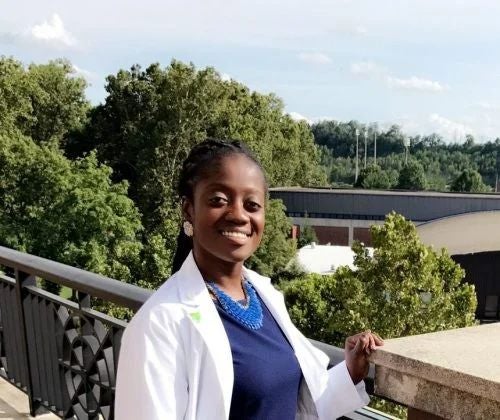Tell us about your current role and/or what you’ve done since finishing medical school?
I’m currently the Chief Resident at the family medicine residency program at Cleveland Clinic in Akron, Ohio. Along with this I volunteer locally for Health fairs in the community to educate the public on chronic diseases. I also perform physical exams for high school-aged students at local schools. Along with this, I’m involved in research focused on using food as medicine through distribution of fresh produce and pre-packaged meals to assess the impact on chronic diseases, such as diabetes and hypertension. I like teaching medical students which I do at a local student-led free clinic during their clinical rotations.
How do you think your time at URI prepared you for medical school?
My courses prepared me for the content on the MCAT. The additional classes I participated in through the Honors Program prepared me to handle the rigorousness and increased load of medical school. URI provided me the opportunity to shadow physicians in family medicine which gave me a better understanding of what I wanted to do in the future and motivated me to choose a career in medicine.
Many pre-health students wonder what life will be like when they get to their professional training. What advice do you have?
The med school curriculum was definitely like drinking from a firehose! It forced me to evaluate and change my study strategies. With good study habits and planning you are able to make room for things you enjoy for leisure. Learn to create room for fun and your mental health/overall health.
How have your professional goals evolved since your undergraduate years?
My career goals did not change much over time; though I originally wanted to be a pediatrician when I started undergrad at URI, I ultimately chose family medicine. With that said, I recommend that premedical students be open-minded and willing to accept change in their goals; given all the options in medicine there is a chance another specialty will interest you.
Once you get to medical school you’ll have the opportunity to learn about all the specialties through your third and fourth year rotations. You will also have the opportunity to seek out additional shadowing opportunities to understand what each specialty looks like. Your chosen specialty is what you’ll apply for in the national residency match.
What do you think are the most important issues in healthcare that pre-health profession students should be most aware of as they prepare for their future careers?
Access to care and bias are very significant issues in medicine. I think it’s important for all providers to learn how to be aware of their own prejudices and biases because there is strong evidence that this can influence the quality of care. Beyond individual providers, socioeconomic inequality affects the ability of certain patient populations to get the care they need. I think it is critically important for premedical students to become aware of these issues even before they enter medical school.
Do you have any other advice for URI students?
Stay focused and don’t give up! Brace yourself when you hit those road bumps along your journey. Find a mentor and continuously seek to grow yourself. Welcome detours that grow you academically and professionally. It is easy to lose sight of why exactly you’re taking certain courses or how exactly certain activities factor into your ultimate goal. Always be open-minded and be willing to be flexible with your goals and plans. Trust that the process/journey will bring you to your final destination of being a physician.

